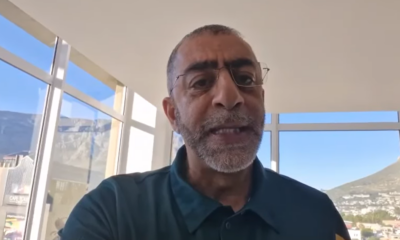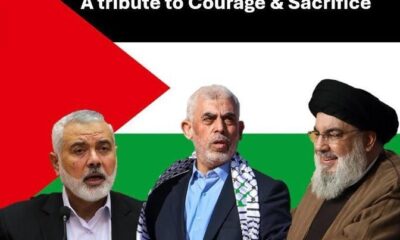
World

Haniyeh’s elimination a message to Tehran
The elimination of Ismail Haniyeh, the head of the Hamas political desk and the former chairperson of Hamas in Gaza, was a long time coming.
This targeted killing of Haniyeh, attributed to Israel, represented a breakthrough. If indeed it was an Israeli action, it crossed the line from fear and containment to the Middle Eastern “language” of assertiveness. With this targeted killing, the message was sent to Iran and its proxies that anyone who directs, finances, supplies, and mobilises terror against Israel will be eliminated. It may have come months late, but it’s an important message nonetheless.
This is the language that the Middle East speaks. Israel has moved from containment to prevention and confrontation of those forces trying to destroy it.
Haniyeh was deeply involved in the planning of the atrocities committed by Hamas on 7 October.
He had made frequent trips to Tehran to meet and strategise with his counterparts in the Islamic Republican Guard Corps (IRGC) under the command of supreme leader Ayatollah Ali Khamenei.
Haniyeh’s elimination may come as a surprise to some. Following the recent mass murder of 12 children in northern Israel’s Druze community of Majdel Shams and subsequent elimination of senior Hezbollah commander Fouad Shukur, the world’s attention was primarily focused on how the conflict between Israel and Hezbollah might evolve.
However, in what appeared to be in sports terms a “head fake”, an act of moving the head in such a way as to deceive an opponent about one’s intended direction or move, the assassination of Haniyeh is an important and strong message to the Iranian regime.
It conveys that Israel’s “long arm” can reach anywhere in the region and beyond, and eliminate terrorists of its choosing when it decides to eliminate them.
The elimination of Haniyeh is particularly important in that it occurred in Iran, especially as he was the guest of the incoming president, Masoud Pezeshkian. This is a strong message to the IRGC and the Iranian leadership that Israel can target the, reach them, and neutralise them with its advanced intelligence network and operational capabilities.
The targeted killing of Haniyeh was an important psychological operation and action by Israel. It sent a resonant message to the Iranian terror network and its proxies across the Middle East, beginning with Hamas, extending to Hezbollah, the Houthis in Yemen, as well as the Iraqi forces under the Iranian regime and beyond that Israel can reach any terrorist leader.
The taking out of Haniyeh was also important because it wasn’t targeted specifically at Hezbollah, so it reduced Hezbollah and Iran’s motivation to launch a major counter-attack.
Haniyeh’s bloody past extended back many years since his election in the 2006 Palestinian parliamentary and presidential elections in which he defeated Fatah and Mahmoud Abbas by a landslide. That election was then discounted by the United States-backed Palestinian Authority and Israel because Hamas failed to abide by the three conditions that the Oslo Peace Accords had laid out for the proper election of a Palestinian leadership.
Haniyeh militarised Hamas’s operational capabilities extraordinarily since the early 2000s, with the help of Iran, while he led Hamas from within Gaza until he was replaced in 2016 by Yahya Sinwar.
Under Haniyeh’s leadership, there were several Hamas terror wars: in 2008 and 2009; the attacks of 2011 and 2012; and 2014 to 2015; and then the well-known Guardian of the Walls counter-terror operation following Hamas’s onslaught in 2021 that also triggered substantial violence within Israel.
Haniyeh had also become an expert in psychological operations and political warfare. Back in 2014, he addressed tens of thousands of Gazans, using as a backdrop a photograph of Nelson Mandela, Martin Luther King Jnr, and Mahatma Gandhi to try to send a message to the world that Hamas was merely a resistance defending its people as opposed to a radical Islamic terror group being mobilised and operated by the Iranian regime.
Even though Haniyeh was a leader of the Sunni Hamas, he had become a well-known Iranian regime operative.
And he had effectively used hybrid warfare, meaning traditional terror actions combined with popular and cognitive-warfare driven mobilisation of the public.
Haniyeh was president of Hamas in Gaza when he drove, directed, and motivated thousands of boys and girls to try to storm the Gaza-Israel security fence in 2018 in what was called the “Great March of Return”, another psychological operation.
It has been reported recently that Haniyeh – who had made his operational headquarters in Doha, Qatar – had been behind some of the intensive Qatari-sponsored efforts to implement a ceasefire, and it was reported in Western media that that positioned him as a peacemaker.
This couldn’t be further from the truth. Haniyeh’s interest was in saving the Hamas regime, keeping it in the “cockpit”, and blowing up the current negotiations between Israel and Hamas by changing and intensifying Hamas’s demands.
Israel’s alleged targeted killing of him wasn’t at the expense of a potential deal with Hamas, but in fact, it was aimed at allowing Israel to continue its successful counter-terror operations and putting much greater pressure on Hamas to do a deal, which otherwise would have resulted in very few live hostages being returned ,and condemning to death the majority of Israeli and American hostages still being held by Hamas.
The overnight elimination of Haniyeh is an important message to Tehran that Israel won’t accept Tehran’s maligned behaviour, its unbridled and frontal attacks on Israel via its proxy terror forces, and its direct attack on 14 April. Israel has many ways to neutralise and defeat the Iranian leadership overnight. This action was only a taste of its capabilities.
It’s also a clear message to Iran’s Lebanon-based leader, Hassan Nasrallah, the leader of Hezbollah, that Israel can eliminate him as well and he is clearly high on the list.
Dr Dan Diker is the president of the Jerusalem Center for Security and Foreign Affairs.











Gary
August 1, 2024 at 3:57 pm
Let us all celebrate the death of this monster. May he roast in hell eternally!